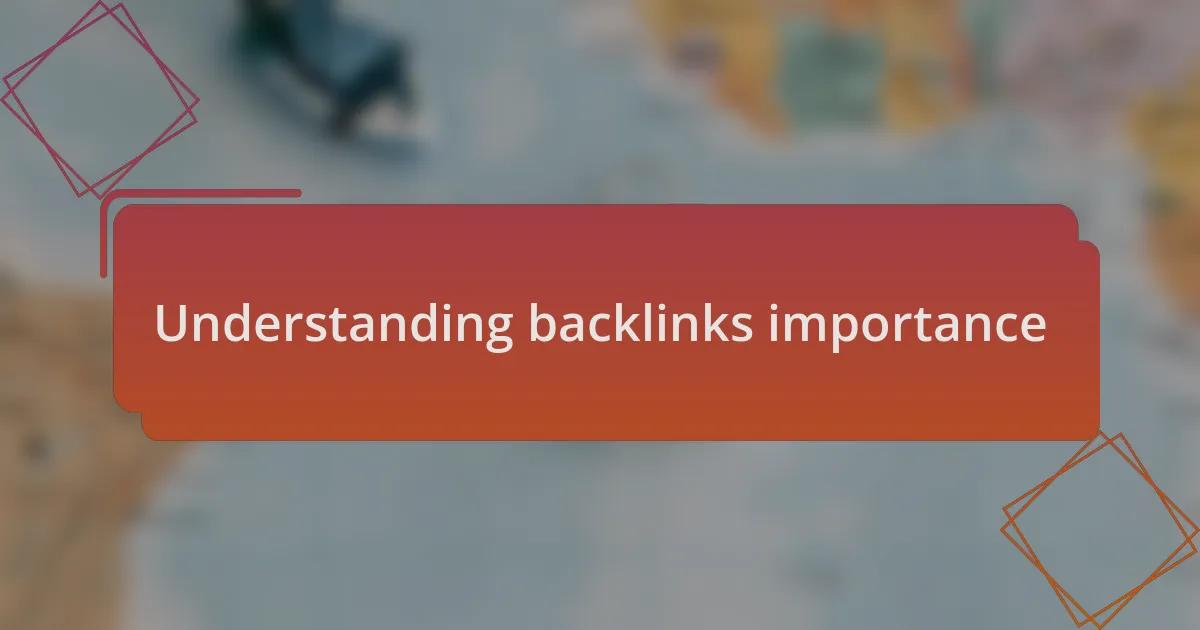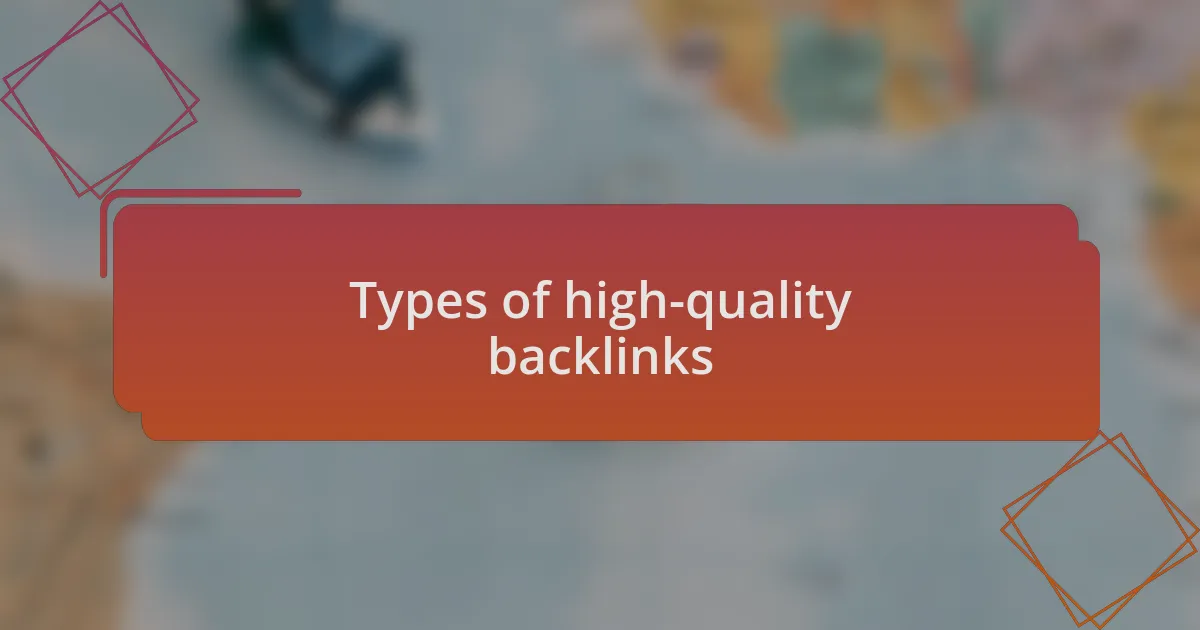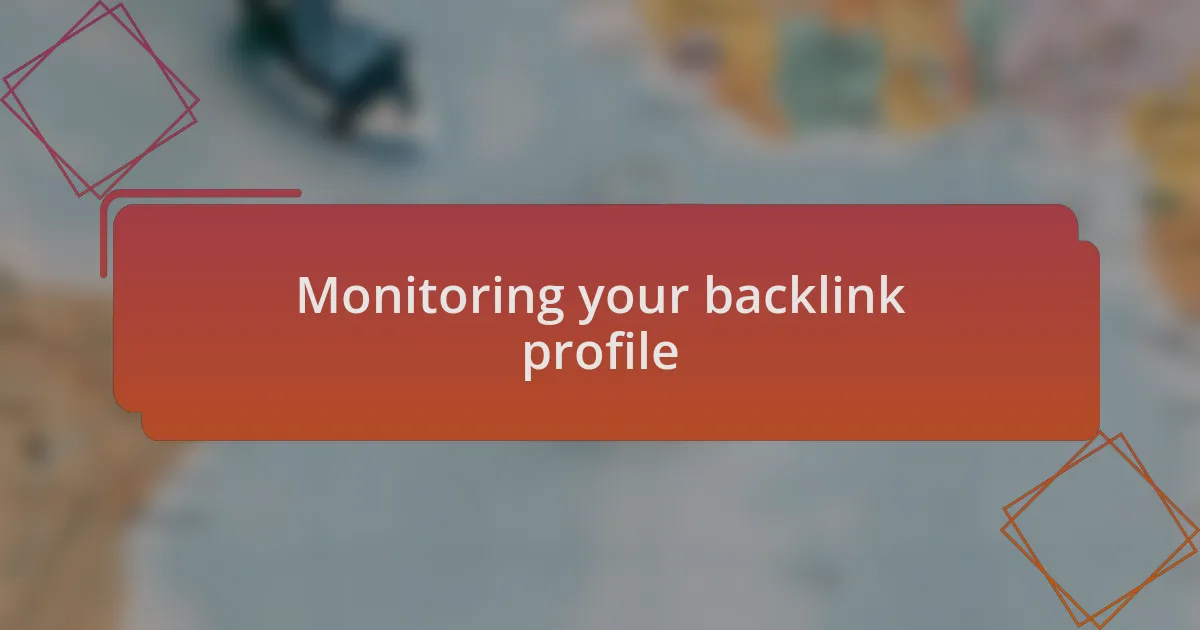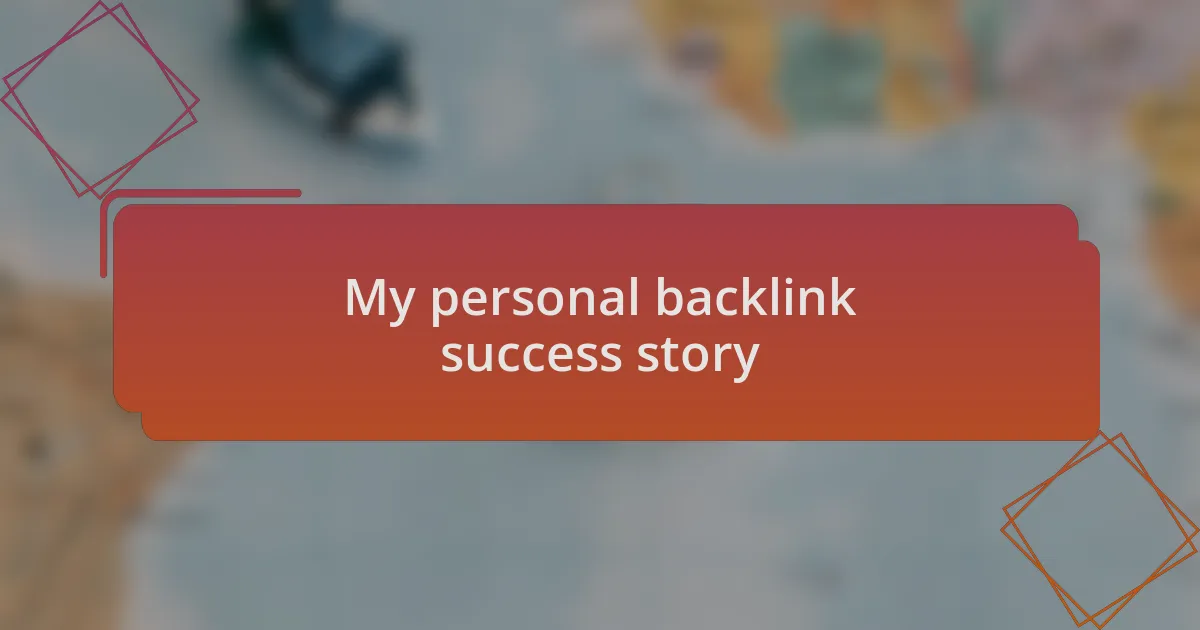Key takeaways:
- Backlinks enhance SEO, visibility, and credibility, fostering community relationships and authority.
- High-quality backlinks can be gained through editorial mentions, resource links, and guest blogging.
- Active monitoring and analysis of backlink profiles help to assess quality and uncover new linking opportunities.
- Authenticity, follow-ups, and diversifying sources are crucial strategies for successful outreach and backlink acquisition.

Understanding backlinks importance
Backlinks are often described as a critical component of SEO, but their real importance goes beyond that buzzword. I remember when I first started focusing on them; I was surprised at how much more traffic and credibility my site gained when reputable sites linked back to me. Have you ever noticed how a recommendation from a trusted friend can influence your choices? Backlinks work in a similar way; they signal to search engines that your content is worth acknowledging.
What’s fascinating is how backlinks not only help with visibility but also foster relationships within the community. When I reached out to other local businesses for collaboration, those discussions often led to mutual linking. It felt rewarding to strengthen ties with peers—after all, isn’t cooperation more powerful than competition?
Moreover, backlinks contribute to building authority in a specific niche. I once landed a link from a well-established local blog after sharing valuable insights on community engagement. The boost in credibility wasn’t just a win for SEO; it also made me feel like I was genuinely contributing to the local ecosystem. So, why do we discount the sheer emotional benefit of being recognized as a go-to resource? The power of backlinks lies not just in numbers but in the trust and authority they cultivate.

Types of high-quality backlinks
High-quality backlinks can be categorized into a few key types that significantly impact your website’s SEO. For instance, editorial backlinks are often the most sought after. I remember when a popular local news site featured my article about community events, and that single link drove a surge in traffic. It felt incredible to see my work recognized by a respected source, reinforcing my belief in the value of creating high-quality content.
Another valuable type is resource backlinks. These are links that come from curated lists or informational pages. I once created a comprehensive guide on local dining options, which led several food bloggers to link back to my site as a reference. It was gratifying to see my content help others while also enhancing my site’s credibility. Have you figured out how you can create content worthy of being included in those lists?
Lastly, guest blogging can also generate high-quality backlinks. I recall reaching out to a local lifestyle blog, offering a well-crafted article in exchange for a link back to my site. Not only did this effort broaden my audience, but it also allowed me to connect with a new community passionate about local culture. The experience was a reminder that genuine, relationship-focused outreach can lead to remarkable opportunities. What types of outreach can you envision that would resonate with your own audience?

Strategies for acquiring backlinks
One of the most effective strategies I’ve found for acquiring backlinks involves leveraging local partnerships. For instance, I approached a nearby nonprofit organization whose mission aligned with my website’s content. By collaborating on an event, not only did we share resources and amplify our community impact, but they also linked to my site from their event page. This experience made me realize how powerful mutual support can be in building credibility online. Have you thought about the organizations in your area that share a similar vision?
Another great method I’ve used is engaging in online communities and forums related to my niche. When I answer questions thoughtfully or contribute valuable insights in discussions, I’ve often been rewarded with backlinks. I remember responding to a query on a local business forum about the best practices for optimizing Google My Business listings. The original poster found my advice helpful and linked back to my site in gratitude. This not only boosted my visibility but also made me feel like a valuable part of the community. What communities do you participate in that might appreciate your expertise?
Lastly, creating infographics has also been a game-changer for me. I designed an easy-to-understand infographic about local SEO trends and shared it with my network. The response was overwhelmingly positive, with numerous sites linking back to me as their source when they shared or referenced my work. This strategy emphasized how visual content can resonate and encourage sharing. Have you considered how visuals can enhance your content strategy?

Monitoring your backlink profile
To effectively monitor your backlink profile, I recommend using tools like Ahrefs or Moz. These platforms allow you to analyze which sites link to you and the quality of those links. I once discovered a backlink from a low-quality site that wasn’t aligned with my values; I promptly reached out to have it removed. This experience taught me that not all backlinks are beneficial—it’s essential to evaluate their relevance and authority.
Regularly auditing your backlinks is crucial. I set aside time each month to review my profile, analyzing any new links and noting any changes. For instance, I once noticed a spike in backlinks after a blog post I published gained traction, reminding me of the importance of continuous engagement with my audience and the content I share. Have you considered how frequently you review your own backlinks?
Sometimes, I find it helpful to keep an eye on my competitors’ backlink profiles as well. By studying where they are getting links, I can uncover new opportunities for my site. I remember feeling excited when I noticed a competitor had a link from a prominent local blog that I hadn’t approached yet. This motivated me to reach out and pitch my own content, understanding that knowledge is power in the pursuit of high-quality backlinks. Are there competitors you could learn from in your niche?

My personal backlink success story
One of my proudest moments in cultivating high-quality backlinks came when I decided to share my expertise through guest blogging. I reached out to a well-respected local website within my industry, crafting a compelling pitch that highlighted the value I could provide their readers. To my delight, they accepted my proposal, and that article not only garnered attention but also resulted in multiple backlinks from other relevant sites that appreciated the content. Has there been a time when a simple outreach transformed your online presence?
Another instance that stands out is when I collaborated with a local charity for an event, which turned out to be tremendously beneficial for both parties. While promoting the event, I wrote about it on my blog and secured backlinks from the charity’s website and their partners. It felt rewarding to contribute to a cause while simultaneously boosting my backlink profile. How often do we overlook the power of genuine collaborations in our backlink strategies?
Lastly, I remember vividly the day I received an email from a prominent industry influencer who had linked to one of my articles as a resource. I hadn’t even reached out to them for a backlink—my content simply resonated with them. That moment solidified my belief that the key to high-quality backlinks often lies in creating valuable, shareable content. Have you ever had a piece of your work unexpectedly recognized by someone influential?

Lessons learned from my journey
Throughout my journey, I learned that authenticity is crucial in building relationships for backlinks. I recall reaching out to a local business owner who I genuinely admired. Instead of a cookie-cutter email, I took the time to share what I loved about their work. The connection was immediate, and they agreed to feature me on their site. Does it surprise you how being genuine can change the course of your outreach strategy?
Another lesson I grasped was the importance of following up. Early on, I had a few potential backlinks slip through my fingers because I didn’t check in after my initial pitch. After realizing this, I started to nurture those connections, occasionally sharing their content or offering assistance. It was eye-opening to see how a simple follow-up could turn a no into a yes. Have you ever thought about the lasting effects of persistence in your networking efforts?
Lastly, I discovered that diversifying my backlink sources made a significant impact. I initially focused solely on blogs and local news sites, but then I branched out to forums and social media groups relevant to my niche. This approach led to unexpected backlinks that I hadn’t considered. Reflecting on that strategy, it inspired me to think outside the box, reminding me that opportunities can be found in the most unlikely places. How often do you explore beyond traditional channels in your own backlink endeavors?